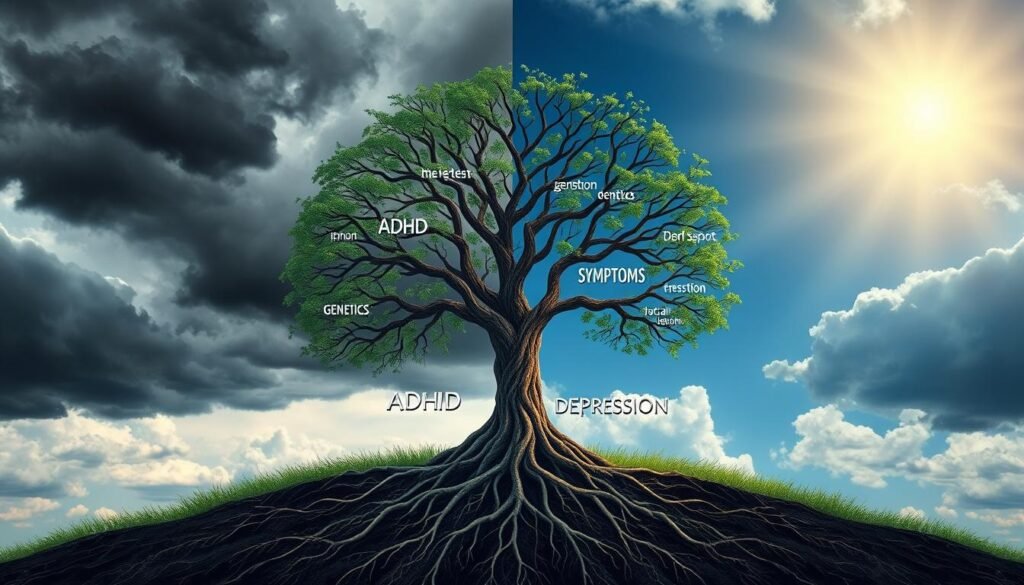About 30% of kids with ADHD also have depression. This makes finding the right treatment harder. Knowing how ADHD and depression interact is key to helping those affected.
Studies show that genes and environment affect the ADHD-depression link. Treating it usually involves both medication and counseling. For more details, visit this resource.
It’s important to tackle ADHD and depression together in today’s world. Not dealing with ADHD can increase the chance of getting depression.
Key Takeaways
- ADHD and depression often co-occur, complicating diagnosis and treatment.
- Approximately 30% of individuals with ADHD will experience a mood disorder or depressive episode.
- Symptoms of ADHD can overlap with those of depression, making them challenging to differentiate.
- Effective management of ADHD-related depression typically involves medication and therapy.
- Genetic and environmental factors play essential roles in the comorbidity of these conditions.
- Understanding this link is crucial for effective intervention and overall mental health improvement.
The Nature of ADHD
ADHD, or Attention Deficit Hyperactivity Disorder, is a brain-based disorder. It affects how you perform daily activities and your overall happiness. It leads to trouble with day-to-day tasks, relationships, and feelings.
Definition and Symptoms
Someone with ADHD may find it hard to keep attention, act on impulse, and be overly active. These issues can impact school, work, and friendships. Some common signs include:
- Inattention: Difficulty in staying focused and organized, often resulting in not finishing tasks.
- Impulsivity: Making quick actions without thinking, which could lead to risky situations or bad choices.
- Hyperactivity: Too much movement and unable to stay still, causing disruption around others.
ADHD and depression often occur together, according to research. People with ADHD are likelier to feel depressed or have mood issues. Recognizing ADHD symptoms early is essential for effective treatment.
Types of ADHD Presentations
ADHD shows up in different forms, such as:
- Inattentive Type: Major trouble with staying focused and being organized. This can affect schoolwork and daily duties.
- Hyperactive-Impulsive Type: Always feeling restless and being impulsive. This can cause unsafe actions and trouble in social settings.
- Combined Presentation: A mix of inattention and hyperactivity-impulsivity symptoms, leading to a range of life challenges.
Identifying the type of ADHD can help in diagnosing it correctly and finding the right ways to manage it.
It’s vital to understand ADHD’s broad impact on mental health. About 70% of those affected have trouble sleeping. Many also deal with other mental health issues. ADHD often comes with Persistent Depressive Disorder (PDD), or dysthymia, making emotional and social growth harder.
Understanding Depression
Depression is a serious mental health issue. It brings long-lasting feelings of hopelessness and a lack of interest in fun activities. Unlike simple sadness, it greatly affects one’s daily life.
People with depression find focusing hard. They might eat too much or too little, sleep poorly, and always feel tired. These problems can also happen with ADHD, making it harder to figure out and treat.
What is Depression?
Depression isn’t just about feeling down. It’s a complex condition that hits your emotions, thoughts, and body hard. There are different types, like major and persistent depressive disorders. Each one brings its own set of challenges.
For those with ADHD, depression makes things worse. It adds to their struggle with impulsiveness and staying focused. This makes socializing and handling everyday tasks tough.
Common Symptoms of Depression
Depression’s symptoms make everyday life hard. Some of the most common ones include:
- Persistent sadness or feeling empty
- Losing interest in fun activities
- Eating too much or too little
- Having trouble sleeping or sleeping too much
- Feeling very tired all the time
- Hard time focusing or deciding things
- Feeling worthless or very guilty
- Thinking about hurting yourself or suicide
When ADHD and depression are both present, the struggles get bigger. ADHD depression comorbidity makes both conditions affect each other badly. Recognizing this early can help find better ways to treat them.
Comorbidity of ADHD and Depression
ADHD and depression are closely linked, showing the complexities of mental health. They are connected, making the risk higher for people with both issues. Understanding the statistics on their correlation is key.
Statistics on Coexisting Conditions
Studies show a big jump in depression among those with ADHD. For example:
- An adult with ADHD is up to six times more likely to get depressed than someone without ADHD.
- 18.6% of ADHD adults aged 18 to 44 have major depression. This is compared to 7.8% of adults without ADHD.
- Adults with ADHD have a 19.4% chance of having bipolar disorder. Only 3.1% of non-ADHD adults get it.
- 12.8% of adults with ADHD face persistent depressive disorder, versus 1.9% of those without ADHD.
These facts show that ADHD adults have a higher chance of depression. It stresses the need for treatment that covers both ADHD and depression. This approach is in line with research that highlights the importance of full evaluations for those with behavioral or emotional issues.
Signs of Comorbid ADHD and Depression
Spotting signs of both ADHD and depression is crucial. Symptoms often overlap, making diagnosis tricky. Look out for:
- Poor focus and concentration.
- Irritability and sudden mood changes.
- Tiredness and low motivation.
- Feelings of hopelessness.
Both ADHD and depression stem from the brain. Recognizing this can help lessen stigma and foster acceptance, clearing the path to effective care. Care plans that note the connection between ADHD and depression are vital for better mental health results.
| Condition | Adult with ADHD (%) | Adult without ADHD (%) |
|---|---|---|
| Major Depression | 18.6 | 7.8 |
| Bipolar Disorder | 19.4 | 3.1 |
| Persistent Depressive Disorder | 12.8 | 1.9 |
The ADHD and Depression Link
The link between ADHD and depression is not simple. It draws attention from those who study the mind and how it works. ADHD is known to increase the risk of someone feeling depressed. Often, what people with ADHD feel can look a lot like depression. This can make it hard to figure out what kind of help someone really needs.
How ADHD Symptoms Overlap with Depression
People who have ADHD might show signs similar to those of depression. For example, having a hard time concentrating, feeling restless, and having a low mood are seen in both. Sometimes, a person who can’t focus might start to feel really frustrated. This can lead to feeling down or even getting depressed. It’s key to see how ADHD can play into one’s emotional state.
The Impact of Social Expectations on Mental Health
Trying to fit into what’s considered “normal” can be tough for someone with ADHD. Not living up to these norms might make a person feel less worthy or lost. This can make depression worse. Young folks might end up feeling on their own, which doesn’t help. That’s why it’s so important to have people who understand and offer the right kind of support.

Does ADHD Cause Depression?
The link between ADHD and depression is complex. People with ADHD often struggle with peer relationships, schoolwork, and emotional connections. These challenges may lead to depression. Studies show that kids with ADHD might face depression more as they grow up.
Research Findings on Causality
Research tries to find out if ADHD directly leads to depression. An important finding is that nearly 19% of adults with ADHD also have depression. This indicates they might be connected. It’s also found that ADHD genetics play a role in this overlap.
Genetic research points out ADHD could be inherited in up to half of cases. This fact suggests a family trend in facing mental health problems.
Environmental Stressors Leading to Depression
ADHD makes dealing with environmental stress harder. People with ADHD often feel more stressed than others. This stress can come from struggling to control impulses or stay focused.
If a child has ADHD and other disorders like oppositional defiant disorder, they’re more likely to be depressed. Untreated ADHD can lead to harsh self-criticism, making depression worse.
| Statistic | Percentage |
|---|---|
| Adults with ADHD having depression | 18.6% |
| Individuals with ADHD treated for depression | Up to 70% |
| Children with ADHD having a serious mood disorder | 10-30% |
| ADHD inherited likelihood (if one parent has it) | 91% |
Risk Factors for Developing Comorbid ADHD and Depression
It’s important to look at the risks of having both ADHD and depression. This includes understanding how gender and the age when problems start can impact someone. Knowing these can help spot and treat these issues early.
Gender Differences in Diagnosis
Whether someone is male or female matters a lot when diagnosing ADHD and depression. Girls are not diagnosed as often as boys. However, they have a higher chance of getting depressed. When girls hit their teenage years, their depression rates almost double compared to boys. For girls, acting out and impulsivity can even connect to trying to harm themselves. This shows the special difficulties they face.
Significance of Early-onset ADHD
If ADHD starts early in life, it can increase the risk of depression. Kids diagnosed young are more likely to feel depressed later. About 44% of people with ADHD will face depression before they turn 30. This is much higher than the 25% of people without ADHD. Being diagnosed early means they might struggle more with making friends and doing well in school.

| Factor | Description | Impact on ADHD and Depression |
|---|---|---|
| Gender | Females diagnosed with ADHD | Higher risk for comorbid depression |
| Early Onset | Children diagnosed at a young age | Increased risk of developing depressive symptoms later |
| Suicidal Behaviors | History of ADHD and associated behaviors | Higher likelihood of suicide attempts |
| Emotional Dysregulation | Issues with managing emotions | Exacerbates depressive symptoms in ADHD |
Understanding these risk factors is key for tackling ADHD and depression together. It helps in finding those at risk early. That way, special care and plans can be made to help them through these challenges.
Treatment Options for ADHD and Depression
Dealing with ADHD and depression at the same time needs a plan that tackles both. This approach is very important for good results. Medication and therapy are both key parts of treatment.
Medication Strategies
Medicines help a lot with the symptoms of ADHD and depression. Adderall and methylphenidate are often used for ADHD. They help you focus better but might make someone feel more depressed. So, it’s important to watch closely how these medicines work.
If stimulants don’t work right, or if they can’t be used, atomoxetine could be another option. Antidepressants like Selective Serotonin Reuptake Inhibitors (SSRIs), such as sertraline and escitalopram, are given to help both problems. Yet, these might have side effects like gaining weight or sexual issues. For really tough depression, Tricyclic Antidepressants or Atypical antidepressants, like Bupropion, are choices. Electroconvulsive Therapy (ECT) may be needed for the hardest cases.
Psychotherapy and Its Benefits
Therapy is important for dealing with the heavy load of ADHD depression. Cognitive Behavioral Therapy (CBT) is a main treatment. It works on bad thought patterns and coping skills. Acceptance and Commitment Therapy (ACT) aids in accepting struggles, focusing on what matters rather than stressful thoughts.
Interpersonal Therapy (IPT) can help those mostly having trouble with others. Dialectical Behavior Therapy (DBT) teaches how to control emotions and be mindful. This is great for people dealing with both ADHD and depression.
To wrap up, combining medication and therapy is key for treating ADHD depression. This mix improves lives and supports well-being for the long term.
Managing ADHD-Related Depression
Managing ADHD-related depression needs several steps. Self-care is very important in this process. It helps those affected to do well every day. By making good lifestyle choices and having support, people can feel much better mentally.
Self-Care Strategies
For better mental health, self-care is key. Here are some things to try:
- Regular Exercise: Working out can lift your mood and help with depression.
- Balanced Nutrition: Eating right helps your mind and body stay healthy.
- Routine Activities: A regular schedule can decrease boredom and help you focus.
- Mindfulness Practices: Meditation and yoga can help you control your emotions.
Importance of Support Networks
Having a good support network is vital. Friends, family, or support groups give emotional and practical help. These bonds can lessen the stress of ADHD and depression, making you stronger.

Research and Innovations in Treatment
Studies continue to uncover the complex link between ADHD and depression. Discoveries in genetics are opening new paths for treatment. This knowledge brings hope for more effective therapies.
Recent Studies on ADHD and Depression
Research shows up to 50% of youth with ADHD or depression might have both. This makes treatment more complex. Additionally, children of mothers with depression have a higher risk of ADHD. These studies highlight the importance of thorough screening and specific interventions. Discovering more about this connection could guide better treatment strategies.
Emerging Therapies and Medications
New treatments for ADHD and depression are being developed. Options range from medications like Ritalin, Adderall, Prozac, and Zoloft to cognitive-behavioral therapy (CBT). Lifestyle changes are also vital for support. It’s crucial that treatment plans can adapt to meet the needs of those with dual diagnoses.
| Condition | Common Comorbidities | Treatment Options |
|---|---|---|
| ADHD | Depression, Anxiety | Stimulants, SSRIs, CBT |
| Depression | ADHD, PTSD | SSRIs, CBT, Lifestyle Modifications |
Conclusion
Understanding how ADHD and depression are connected is very important. Millions suffer from ADHD, which can increase anxiety and lower self-esteem. This can lead to depression. It’s hard to say if ADHD causes depression because they often happen together. Studies show ADHD is common with anxiety disorders. This can make kids and adults feel even more upset.
Managing ADHD and depression well is key to a better life. Treatments usually mix medication and therapy. They focus on ADHD challenges and help with depression too. Healthcare workers need to understand the ADHD-depression link. This will help them do better screenings and treatments.
More research on ADHD and depression is needed. This research will help us understand it better. Looking into genetics and how the environment affects it will help. Healthcare workers can then diagnose and treat people more effectively. This will help those dealing with these tough mental health issues in the long run.